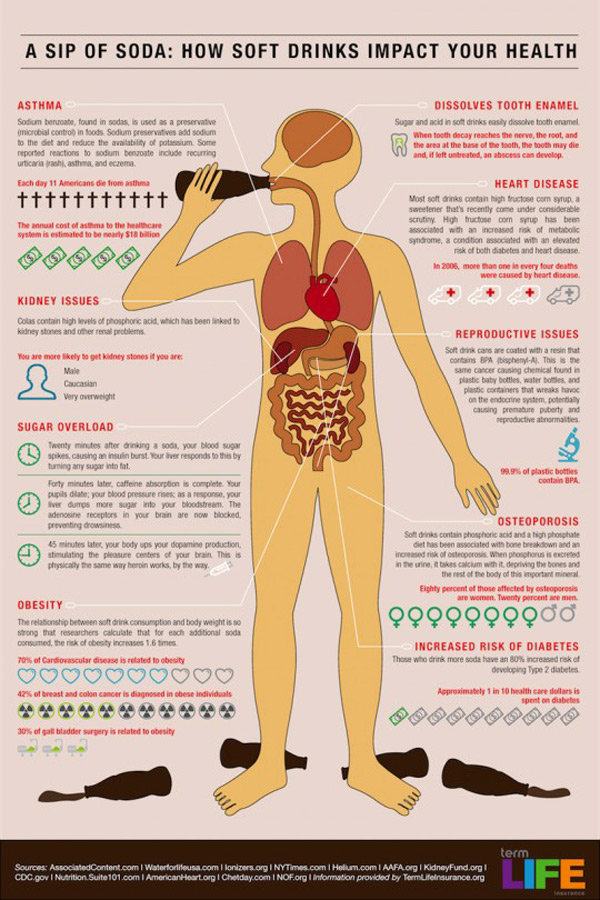The less soda we drink, the healthier we’ll be; the drink has been linked to a myriad of ailments including obesity, diabetes, and tooth decay. In turn, health costs would be alleviated, too.
|
The Mexican government approved the sales tax on soda drinks in 2013. In 2014, it went into effect: a roughly 20% sales tax on all sugar-sweetened beverages. According to an observational study published in the BMJ. Within a year, people in Mexico were buying 12% fewer sugar-sweetened beverages. That’s not all — within the same period of time, sales of bottled water rose 4%. If that has proved successful in one country then why not implement it all over the world. |
Soda Consumption & its Effects
As soon as soda’s swallowed, the pancreas is notified and rapidly begins to create insulin in response to the sugar. Insulin is a hormone the body uses to move sugar from food or drink into the bloodstream, where cells are then able to use sugar for energy. Within just 20 minutes, blood sugar levels spike and the liver responds to the insulin by turning sugar into fat for storage. Within 45 minutes of gulping down a single 20-ounce glass of soda, caffeine from the drink is fully absorbed, and as a result your pupils dilate and blood pressure rises. The body produces more dopamine, which stimulates the pleasure centers of the brain — just like a low-grade line of cocaine. When the hour chimes, the body begins to experience a blood sugar crash, which is around the same time a person reaches for their second soda, or for another sweet and sugar snack to suffice.
Why Avoid Soda?
- A single can of soda contains the equivalent of 10 teaspoons of sugar.
- Soda contains phosphoric acid, which interferes with the body’s ability to absorb calcium and can lead to osteoporosis and bone softening.
- Most sodas contain caffeine, which has been linked to certain cancers, breast lumps, irregular heart beat, high blood pressure, and other problems.
- The water used in soda is just simple tap water and can contain chemicals like chlorine, fluoride and traces of heavy metals.
- In diet sodas, aspartame is used as a substitute for sugar, and can actually be more harmful. It has been linked to almost a hundred different health problems including seizures, multiple sclerosis, brain tumors, diabetes, and emotional disorders.
- High sugar, sodium and caffeine content in soda, dehydrates the body and over a long period of time can cause chronic dehydration.
- Drinking soda regularly causes plaque to build up on the teeth and can lead to cavities and gum disease..
- Sodas contain High Fructose Corn Syrup, which obviously comes from corn. Most of this corn has been genetically modified.
- Soda is an unnatural substance that harms the body.

How to Fight the Craving?
- Start slow by replacing sugared sodas with diet ones.
- Cut down gradually: replace one regular soft drink (or one diet soda) per day with an alternative drink. The best choice: water.
- If you really need something with a boost of flavor, try calorie-free flavored waters and seltzers.
- If it’s the caffeine you crave, you’re better off with tea or coffee, with minimal added sugars.
If you really love something, don’t put it completely off limits. You won’t be able to stick to it.
Its time You start respecting your body, to stay the best.
Disclaimer
The Content is not intended to be a substitute for professional medical advice, diagnosis, or treatment. Always seek the advice of your physician or other qualified health provider with any questions you may have regarding a medical condition.




